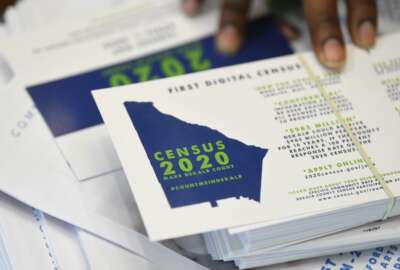

The Trump administration amid the coronavirus pandemic has urged Congress to extend the timeline for the decennial count.
This story was updated at 1:35 p.m. Tuesday, April 14 to include statements from former Census Bureau officials.
While nearly half of all American households have responded to the 2020 census, the Trump administration amid the coronavirus pandemic has urged Congress to extend the timeline for the decennial count.
The Census Bureau had already postponed hiring and field operations through April 15, but Commerce Department and White House officials told members of the House Oversight and Reform Committee on Monday that they have requested putting field operations on hold through June 1.
While the Census Bureau’s contingency planning has allowed some wiggle room for critical steps like non-response follow up, the administration’s request will conflict with a statutory mandate to send the decennial count data to Congress and the president by Dec. 31.
For this updated timeline to work, Congress would have to pass a bill to push back these statutory deadlines.
Under the administration’s new timetable, the bureau would keep self-response and non-response follow-up running through the end of October this year, which would push back the deadline for the bureau to submit its apportionment data to April 30, 2021.
The bureau, under this new timeline, would send redistricting data to states by July 31, 2021.
House Oversight and Reform Committee Chairwoman Carolyn Maloney (D-N.Y.) said the committee will consider the administration’s request, but said members have asked for more information that the administration, up until this point, “has been unwilling to provide.”
“The Constitution charges Congress with determining how the Census is conducted, so we need the administration to cooperate with our requests so we can make informed decisions on behalf of the American people,” Maloney said in a statement.
Committee members, she added, has asked for a briefing from bureau officials since last month.
Meanwhile, Maloney said Monday’s call to push back 2020 census deadlines included Commerce Secretary Wilbur Ross, Deputy Secretary Karen Dunn Kelley and acting Office of Management and Budget Director Russ Vought, but not Census Bureau Director Steven Dillingham or census officials.
However, four former census bureau directors said in a joint statement Tuesday that they support the decision to push back 2020 census deadlines, and the operational and schedule adjustments that come with it, based on discussions with the bureau’s senior career leadership and “technical, scientific and operational staff at the Census Bureau.”
“The genius of the census has always been finding a Plan B when conditions rule out Plan A. For 2020, Plan B includes a schedule adjustment,” the former officials wrote.
John Thompson, the last permanent census director before Dillingham, and one of the former directors behind the joint statement, told Federal News Network that the contingency plan gives the bureau the flexibility it needs to complete the decennial count.
“This is an unprecedented situation that we’re in – both our country and the people taking the 2020 census, and so it may evolve even further,” Thompson said about the updated timeline. “But at this point in time, I think that this is the best plan that the census bureau can develop.”
If Congress doesn’t pass a bill to amend Title 13 of the U.S. Code, then the bureau, by law, must submit apportionment data to the Commerce Department, which in turn must send it to Congress and the president by Dec. 31, 2020.
“Right now, if that were to happen, I think the quality of that data, it would not be of as high quality as it could be,” Thompson said.
Having enumerators knocking on doors during the non-response follow-up phase of the decennial count, he added, remains essential to get an accurate count of hard-to-count populations.
The bureau originally planned to have enumerators carry out their work from May 13 through July 31, but under the new timeline, non-response follow-up will run from August 11 through October 31.
During this pause in field operations, census officials have put a hold on follow-up steps for job offers, such as background checks and fingerprinting. However, the public can continue to fill out census job applications online and complete the online assessment that comes with the application.
Meanwhile, bureau officials have been authorized to dip into a $2 billion contingency fund for the decennial count to make any changes necessary to its operations.
Vanita Gupta, the president and CEO of The Leadership Conference of Civil and Human Rights and The Leadership Conference Education Fund, said the organization supports the bureau’s updated timeline for the decennial count.
“However, if it’s not safe to have census takers visiting people’s homes by June, then Congress has an obligation to consider other options to protect census workers and the communities they serve, and to ensure an equitable count,” Gupta said in a statement. “We cannot afford to compromise the health of our communities or the fairness and accuracy of the census.”
Copyright © 2025 Federal News Network. All rights reserved. This website is not intended for users located within the European Economic Area.
Jory Heckman is a reporter at Federal News Network covering U.S. Postal Service, IRS, big data and technology issues.
Follow @jheckmanWFED

